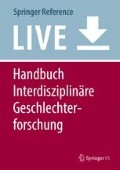Zusammenfassung
Ökofeminismus kritisiert die Ausbeutung menschlicher und natürlicher ReProduktivität im Kapitalismus. Der Nexus „Frau-Mutter-Natur“ und die Natur-Kultur-Dichotomie stehen im Fokus der Analyse gesellschaftlicher Herrschaftsverhältnisse. Queer Ecologies erweitern die Perspektive um die Kritik an Heteronormativität.
Literatur
Alaimo, Stacy. 2000. Undomesticated ground. Recasting nature as feminist space. Ithaca: Cornell University Press.
Alaimo, Stacy, Hrsg. 2017. Gender: Matter. Farmington Hills: Macmillan.
Alaimo, Stacy, und Susan Hekman, Hrsg. 2008. Material feminisms. Bloomington: Indiana University Press.
Barad, Karen. 2008 [2003]. Posthumanist performativity: Toward an understanding of how matter comes to matter. In Material feminisms, Hrsg. Stacy Alaimo und Susan Hekman, 120–154. Bloomington: Indiana University Press.
Bauhardt, Christine. 2011. Gesellschaftliche Naturverhältnisse von der Materialität aus denken. Feministische Ökonomik, Queer Ecologies und das Konzept Ressourcenpolitik. GENDER. Zeitschrift für Geschlecht, Kultur und Gesellschaft 3(3): 89–10.
Bauhardt, Christine. 2016. Stichwort: Ökofeminismus. In Handbuch Umweltethik, Hrsg. Konrad Ott, Jan Dierks und Lieske Voget-Kleschin, 212–216. Stuttgart: Metzler.
Bauhardt, Christine. 2017. Living in a Material World. Entwurf einer queer-feministischen Ökonomie. GENDER. Zeitschrift für Geschlecht, Kultur und Gesellschaft 9(1): 99–114.
Fraser, Nancy. 2009. Feminismus, Kapitalismus und die List der Geschichte. Blätter für deutsche und internationale Politik 53(8): 43–57.
Gaard, Greta. 1997. Toward a queer ecofeminism. Hypatia 12(1): 114–137.
Gaard, Greta. 2011. Ecofeminism revisited: Rejecting essentialism and re-placing species in a material feminist environmentalism. Feminist Formations 23(2): 26–53.
Haraway, Donna. 1988. Situated knowledges: The science question in feminism and the privilege of partial perspective. Feminist Studies 14(3): 575–599.
Haraway, Donna. 2003. The companion species manifesto. Dogs, people, and significant otherness. Chicago: Prickly Paradigm Press.
Holland-Cunz, Barbara. 2014. Die Natur der Neuzeit. Eine feministische Einführung. Opladen/Farmington Hills: Verlag Barbara Budrich.
MacGregor, Sherilyn. 2006. Beyond mothering earth. Ecological citizenship and the politics of care. Vancouver: University of British Columbia Press.
Mellor, Mary. 1997. Feminism & ecology. New York: New York University Press.
Merchant, Carolyn. 1980. The death of nature. Women, ecology, and the scientific revolution. San Francisco: Harper & Row.
Mies, Maria, und Vandana Shiva. 1995. Ökofeminismus. Beiträge zur Praxis und Theorie. Zürich: Rotpunkt.
Phillips, Anne. 2010. What’s wrong with essentialism? Distinktion: Scandinavian Journal of Social Theory 11(1): 47–60.
Plumwood, Val. 1993. Feminism and the mastery of nature. London/New York: Routledge.
Salleh, Ariel. 1997. Ecofeminism as politics: Nature, Marx and the postmodern. London: Zed Books.
Sandilands, Catriona. 2001. Desiring nature, queering ethics: Adventures in erotogenic environments. Environmental Ethics 23(2): 169–188.
Sturgeon, Noël. 1997. Ecofeminist natures. Race, gender, feminist theory and political action. London: Taylor and Francis.
Wichterich, Christa. 1992. Die Erde bemuttern: Frauen und Ökologie nach dem Erdgipfel in Rio. Köln: Heinrich-Böll-Stiftung.
Author information
Authors and Affiliations
Corresponding author
Editor information
Editors and Affiliations
Rights and permissions
Copyright information
© 2017 Springer Fachmedien Wiesbaden GmbH
About this entry
Cite this entry
Bauhardt, C. (2017). Ökofeminismus und Queer Ecologies. In: Kortendiek, B., Riegraf, B., Sabisch, K. (eds) Handbuch Interdisziplinäre Geschlechterforschung. Geschlecht und Gesellschaft, vol 65. Springer VS, Wiesbaden. https://doi.org/10.1007/978-3-658-12500-4_159-1
Download citation
DOI: https://doi.org/10.1007/978-3-658-12500-4_159-1
Received:
Accepted:
Published:
Publisher Name: Springer VS, Wiesbaden
Print ISBN: 978-3-658-12500-4
Online ISBN: 978-3-658-12500-4
eBook Packages: Springer Referenz Sozialwissenschaften und Recht
Publish with us
Chapter history
-
Latest
Ökofeminismus und Queer Ecologies: feministische Analyse gesellschaftlicher Naturverhältnisse- Published:
- 28 November 2017
DOI: https://doi.org/10.1007/978-3-658-12500-4_159-3
-
Ökofeminismus und Queer Ecologies: feministische Analyse gesellschaftlicher Naturverhältnisse
- Published:
- 26 October 2017
DOI: https://doi.org/10.1007/978-3-658-12500-4_159-2
-
Original
Ökofeminismus und Queer Ecologies- Published:
- 13 July 2017
DOI: https://doi.org/10.1007/978-3-658-12500-4_159-1

